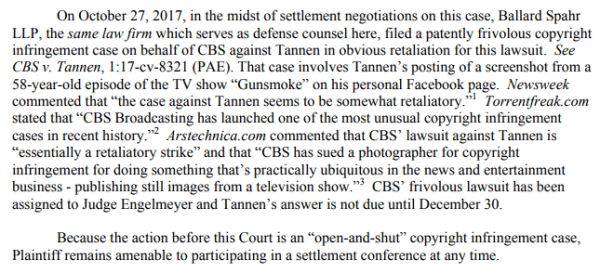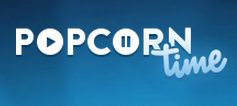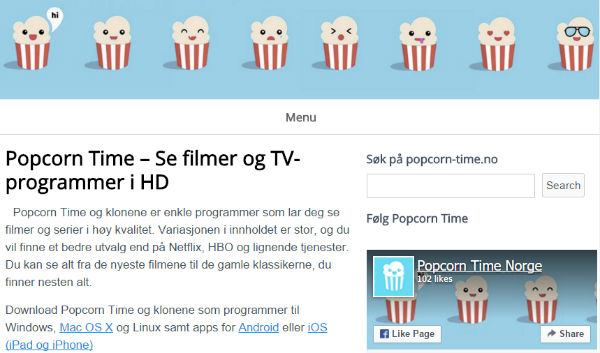CBS Drops Lawsuit Over ‘Pirated’ Screenshot of 59-Year-Old TV Show
vendredi 15 décembre 2017 à 22:44 Over the past year, dozens of independent photographers have taken mainstream media outlets to court, accusing the companies of using their work without permission.
Over the past year, dozens of independent photographers have taken mainstream media outlets to court, accusing the companies of using their work without permission.
While the photographers only have a tiny fraction of the legal budgets of their wealthy adversaries, they have managed to score several settlements.
This is no surprise, as the evidence in these cases is often undisputed. However, New York photographer Jon Tannen learned that going up against a media mogul is not without risk. When he sued CBS Broadcasting a few weeks ago, the company ‘retaliated’ in a highly unusual way.
Instead of resolving the matter behind closed doors, CBS came out guns blazing. The company filed a lawsuit against the photographer accusing him of posting a copyright-infringing screenshot of a TV show on social media – the 59-year-old show Gunsmoke.
While posting a half-century old screenshot of an episode is quite different from using a recent photograph in a commercial publication, CBS branded Tannen a hypocrite in the complaint.
Follow up filings revealed how things spiraled out of control. Both parties were not able to agree on a settlement. According to CBS, Tannen demanded more than 100 times the value of a license, which they refused to pay.
Instead, they filed a lawsuit of their own. It was a clear retaliatory move and without informing the photographer in advance, attorney Richard Liebowitz wrote to the court.
“[I]n the midst of settlement negotiations on this case, Ballard Spahr LLP, the same law firm which serves as defense counsel here, filed a patently frivolous copyright infringement case on behalf of CBS against Tannen in obvious retaliation for this lawsuit,” he writes.

While lawsuits over TV show screenshots are highly unusual, this one apparently revitalized the settlement negotiations.
Both parties recently informed the court that they are finalizing an agreement in the initial lawsuit, which will end the case. As a result, CBS also dismissed its case against the photographer this week. As is usual, details of the settlement are not disclosed.
Meanwhile, another photographer filed a lawsuit against CBS this week, again represented by attorney Richard Liebowitz, who’s not hesitant in targeting the company again.
In this case the photographer, New York-based Lawrence Schwartzwald, accuses CBS Interactive of using a photo he took of actress Barbara Streisand and actor Jeff Bridges on CBSNews.com without obtaining permission.
With a screenshot of the photo of the site on file, the evidence looks quite compelling. However, let’s see if CBS can dig up some dirt on the photographer’s social media accounts this time round.
—
A copy of Schwartzwald’s complaint is available here (pdf).
Source: TF, for the latest info on copyright, file-sharing, torrent sites and more. We also have VPN discounts, offers and coupons
 A few years ago, Popcorn Time gained popularity worldwide, mostly thanks to its ability to stream torrent files through a user-friendly interface.
A few years ago, Popcorn Time gained popularity worldwide, mostly thanks to its ability to stream torrent files through a user-friendly interface.
 In 2012, file-hosting site Megaupload was shut down by the United States government and founder Kim Dotcom and his associates were arrested in New Zealand.
In 2012, file-hosting site Megaupload was shut down by the United States government and founder Kim Dotcom and his associates were arrested in New Zealand. In recent months, millions of people have protested the FCC’s plan to repeal U.S. net neutrality rules, which were put in place by the Obama administration.
In recent months, millions of people have protested the FCC’s plan to repeal U.S. net neutrality rules, which were put in place by the Obama administration.